- Home
- Alan Bennett
Four Stories Page 2
Four Stories Read online
Page 2
‘At some point,’ murmured the minister, ‘I want you to take me on one side and explain to me the difference between carbon monoxide and carbon dioxide. Fairly star-studded, wasn’t it?’
It was, indeed, a remarkable assembly with philanthropy, scholarship and genuine distinction represented alongside much that was tawdry and merely fashionable, so that with only a little licence this stellar, but tarnished throng might, for all its shortcomings, be taken as a version of England.
And ‘a very English occasion’ was how it was described by the reporter in the Telegraph the next day. Not that she was in a position to know as she hadn’t bothered to stay for the service. Currently taking down the names of the last few stragglers she compiled her list, procured a programme of the proceedings, then went off to the Design Museum to lunch with a colleague.
‘After all,’ she said over oeufs en gelée, ‘they’re all the same these occasions. Like sad cocktail parties without the drinks.’
This one as it turned out wasn’t, so she got the sack. But it was a nice lunch.
Also thinking how English these occasions tended to be was the young priest in charge, Father Geoffrey Jolliffe. Father Jolliffe was Anglican but with Romish inclinations that were not so much doctrinal as ceremonial and certainly sartorial. Amiable, gregarious and plump, he looked well in the cloak he generally went about in, a priest with a bit of a swish to him. His first curacy had been in a slum parish where, as he put it, ‘They like a bit of that,’ and since he did too, his ministry got off to a good start and that he chose to call the Eucharist ‘Mass’ and himself ‘Father’ troubled no one. His present parish, St Andrew Upchance on the borders of Shoreditch and the City, was also poor, but he had done a good deal to ‘turn it round’, an achievement that had not gone unnoticed in the diocese, where he was spoken of as a coming man.
There were, it is true, some of his fellow clergy who found him altogether too much, but as he said himself, ‘There’s not enough of “too much” these days,’ and since he was a lively preacher and old-fashioned when it came to the prayer book, a large and loyal congregation seemed to bear this out.
Used at his normal services to women predominating, today Father Jolliffe was not altogether surprised to find so many men turning up. Some of them had been close to Clive, obviously, but that apart, in his experience men needed less cajoling to attend funerals and memorial services than they did normal church (or even the theatre, say) and since men seldom do what they don’t want, it had made him wonder why. He decided that where the dead were involved there was always an element of condescension: the deceased had been put in his or her place, namely the grave, and however lavish the tributes with which this was accompanied there was no altering the fact that the situation of the living was altogether superior and to men, in particular, that seemed to appeal.
USUALLY CHEERFUL AND EXPANSIVE, today Father Jolliffe was preoccupied. He had known Clive himself, which accounted for his church being the somewhat out of the way venue for the memorial service. His death had come as an unpleasant surprise, as, like so many in the congregation, he had not known Clive was even ill. It was sad, too, of course, ‘a shared sadness’ as he planned to say, but for him, as for others in the congregation, it was somewhat worrying also (though he had no plans to say that).
Still, if he was anxious he did not intend to let it affect his performance. ‘And,’ as he had recently insisted to a Diocesan Selection Board, ‘a service is a performance. Devout, sincere and given wholeheartedly for God, but a performance nevertheless.’
The Board, on the whole, had been impressed.
By coincidence the subject of memorial services had come up at the Board when Father Jolliffe, suppressing a fastidious shudder, had heard himself describe such occasions as ‘a challenge’. Urged to expand he had shared his vision of the church packed with unaccustomed worshippers come together, as they thought, simply to commemorate a loved one but also (though they might not know it) hungering for that hope and reassurance which it was the clergy’s job to satisfy. This, too, had gone down well with the Board though most them, Father Jolliffe included, knew it was tosh.
The truth was memorial services were a bugger. For all its shortcomings in the way of numbers a regular congregation was in church because it wanted to be or at least felt it ought to be. It’s true that looking down from the pulpit on his flock Sunday by Sunday Father Jolliffe sometimes felt that God was not much more than a pastime; that these were churchgoers as some people were pigeon-fanciers or collectors of stamps, gentle, mildly eccentric and hanging onto the end of something. Still, on a scale ranging from fervent piety to mere respectability, these regular worshippers were at least like-minded: they had come together to worship God and even with their varying degrees of certainty that there was a God to worship the awkward question of belief seldom arose.
With a memorial service, and a smart one at that, God was an embarrassment and Father Jolliffe was reminded of this when he had his first sight of the congregation. He had left his service book in his stall and nipping across to get it before putting on his robes he was taken aback at the packed and murmuring pews. Few of those attending, he suspected, had on taking their seats bowed their heads in prayer or knew that was (once anyway) the form. Few would know the hymns, and still fewer the prayers. Yet he was shortly going to have to stand up and ask them to collaborate in the fiction that they all believed in God (or something anyway) and even that there was an after-life. So what he had said to the Board had been right. It was a challenge, the challenge being that most of them would think this an insult to their intelligence.
How Father Jolliffe was going to cope with this dilemma was interesting Treacher. Indeed it was partly what had brought him to St Andrew’s on this particular morning. There were various ways round it, the best of which, in Treacher’s view, was not to get round it at all; ignore it in fact, a priest retaining more respect if he led the congregation in prayer with neither explanation nor apology, the assumption being that they were all believers and if not, since they were in the house of God, it behoved them to pretend to be so. Taking the uncompromising line, though, meant that it was hard then for the clergyman to get on those friendly, informal terms with the congregation that such an occasion seemed to require. Treacher did not see this as a drawback. A priest himself, although in mufti, getting on friendly terms with the congregation had never been high on his list.
Father Jolliffe would not have agreed. ‘Whatever else it is,’ he had told the Board, ‘a congregation is first and foremost an audience. And I am the stand-up. I must win them over.’ It was another bold-seeming sentiment that had hit the spot, occasioning some laughter, it’s true, but also much sage nodding, though not, Father Jolliffe had noticed, from Canon Treacher, who was an archdeacon and not enthusiastic about congregations in the first place. Treacher (and his fiercely sharpened pencil) was the only one of the Board who had made him nervous (the Bishop was a sweetie), so it was a blessing that on this particular morning, thanks to Canon Treacher’s precautions, the priest remained unaware of his presence.
The worst tack a priest could adopt at a service such as this, and a trap Treacher was pretty confident Father Jolliffe was going to fall into, was to acknowledge at the start that the congregation (or ‘friends’ as Treacher had even heard them called) might not subscribe to the beliefs implicit in the hymns and prayers but that they should on no account feel badly about this but instead substitute appropriate sentiments of their own. (‘I believe this stuff but you don’t have to.’) Since in Treacher’s experience there would be few in the church with appropriate sentiments still less beliefs to hand, this meant that if the congregation thought of anything at all during the prayers (which he doubted) it was just to try and summon up a picture of the departed sufficient to squeeze out the occasional tear.
Treacher, it has to be said, had some reason for his pessimism. Casting an eye over the Order of Service Treacher noted that in addition to a saxophone solo a
fashionable baritone from Covent Garden was down to sing ‘Some Enchanted Evening’. With such delights in prospect Father Treacher feared that liturgical rigour would not be high on the list.
What approach he was going to take to the service (‘what angle the priest should come at it’) Father Jolliffe had not yet decided, though since he was even now being robed in the vestry it might be thought there was not much time. But he had never been methodical, his sermon often no more than a few headings or injunctions to himself on the back of the parish notes: though on this occasion he had not even bothered with that, preferring, as he would have said, to ‘wing it’. This was less slipshod than it sounded, as he genuinely believed that in this ‘winging’ there was an element of the divine. He had never thought it out but felt that the wings were God-sent, an angel’s possibly, or another version of ‘Thy wings’ under the shadow of which he bade the faithful hide Sunday by Sunday.
He slipped out of the vestry and made his way round the outside of the church to join the choir now assembled at the West door. When he had been appointed vicar at St Andrew’s processions generally began obscurely at the vestry winding their awkward way round past the pulpit and up the chancel steps. Father Jolliffe felt that this was untheatrical and missing a trick so one of his first innovations was to make the entrance of the choir and clergy bolder and more dramatic, routeing the procession down the centre of the church.
The procession should have been headed and the choir preceded by a crucifer bearing the processional cross (another innovation), but since this was a weekday Leo, the crucifer, had not been able to get time off work. A beefy young man, Leo was a bus driver and Father Jolliffe had always taken quiet pride in that fact and would occasionally cite him at diocesan conferences as a modern update of the calling of the disciples (‘Matthew may have been a tax-collector. What’s so special about that? Our crucifer happens to be a bus driver’). Though Leo would have much preferred marching down the centre aisle to where he currently was, stuck behind the wheel of a No. 74 inching up Putney High Street, since privatisation religious obligation was no longer accepted as a reason for absence. ‘Or believe me, my son,’ said the supervisor, ‘come Ramadan and our Sikh and Hindu brethren who compose a substantial proportion of the workforce would be up at the mosque when we need them down at the depot. I’m not without religious feeling myself and my sister-in-law was nearly a nun but sorry, no can do.’
Still, what the procession lacked in splendour at the front it made up in dignity at the back, as in addition to Father Jolliffe also attending the service were several other clergymen, one of them indeed a suffragan bishop. None of them was personally known to Father Jolliffe or seemingly to each other, but all were presumably known to Clive. Though got up in all their gear they were not attending in any official capacity (and in the Telegraph report of the occasion they would be described as ‘robed and in the sanctuary’), but they definitely brought a kick to the rear of the column which was now assembled and waiting to begin its journey towards the chancel.
The organist was meanwhile playing an arrangement of Samuel Barber’s ‘Adagio for Strings’ which many in the congregation were enjoying, having been made familiar with the tune from its frequent airings on Classic FM. Seeing no conclusion in the offing Father Jolliffe pressed a button behind a pillar to alert the organist that they were ready to begin. The Barber now came to a sharp and unceremonious close but since random terminations were not unusual on Classic FM, nobody noticed.
Now from somewhere at the back of the church Father Jolliffe’s voice rang out, ‘Would you stand’ and the church shuffled to its feet. ‘We shall sing the first hymn on your Order of Service, “Love Divine All Loves Excelling”.’
Once upon a time it would have been enough to announce the hymn and the congregation would have known to stand. Hymns you stand, prayers you kneel. Nowadays it was prayers you sit, hymns you wait and see what other people are going to do. ‘Love,’ Father Jolliffe reproached himself. ‘We must love one another.’
Now the clergy began to follow the choir down the aisle, Father Jolliffe bringing up the rear, singing the hymn without consulting the words, long since off the book and thus free while singing heartily to cast professionally loving glances to right and left, on his pink and generous face an expression of settled benevolence.
He had still not decided how to pitch his opening remarks, trusting even now that something would occur, in some ways the closest he got to faith in God this trust that when it came to the point words would be put into his mouth. As he passed through the worshippers raggedly singing the hymn, Father Jolliffe thought they looked less like a congregation than an audience, smart, worldly and doubtless expecting him to keep God very much on the back burner. He resented this a little, because, though he was a sophisticated priest and too self-forgiving, his faith was real enough, though so supple and riddled with irony that God was no more exempt from censure than the Archbishop of Canterbury (whom he privately referred to as Old Potato-Face). Still, he resented having to tailor his beliefs to his audience and not for the first time wished he was an out and out Catholic where this problem wouldn’t arise. One of the many grumbles Father Jolliffe had about the English Reformation was that it was then that feeling had got into the service, so you couldn’t get away with just saying the words but had to mean them at the same time.
These thoughts had taken him and the procession to the chancel, where the choir filed into their pews and the spare clergy disposed themselves around, while still leaving the hymn with a couple of verses to run. This gave Father Jolliffe a chance to think about what he ought to say about Clive and what he ought not to say.
CLIVE HAD BEEN A MASSEUR; there was no secret about that. It was something he was very good at and his skill transcended mere physical manipulation. Many of his clients attested to a feeling of warmth that seemed to flow through his fingers and for which there was no orthodox physiological explanation. ‘He has healing hands’ was one way of putting it or (this from the more mystically inclined) ‘He has the Touch.’
That Clive was black (though palely so) was thought by some to account for these healing attributes since it meant (despite his having been born and brought up in Bethnal Green) that he was closer to his origins than were his clients and in touch with an ancient wisdom long since lost to them. Never discouraging these mythic speculations Clive himself had no such illusions, though the pouch to which he sometimes stripped to carry out the massage was rudimentary enough to call up all sorts of primitive musings.
The heat that his clients felt, though, was not fanciful and as a boy had embarrassed Clive and made him reluctant to touch or be touched. The realisation that what he had was not a burden but a gift was a turning point and that, with his calorific propensities, it could be marketed was another. And so the laying on of hands became for him a way of life.
This was not, of course, all. Though Clive was scrupulous never to omit the ceremony of massage, for some it was just the preliminary to a more protracted and intimate encounter and one which might, understandably, come a little dearer. Looking over the crowded church, Father Jolliffe wondered who were here just as grateful patients whose burden of pain Clive had smoothed away and who had come along to commemorate the easing of a different sort of burden, and of the latter how many were as nervous as he was himself about the legacy that the dead man might have left them.
NOW AS THE HYMN ENDED Father Jolliffe said, ‘Will you sit’, gave them a moment to settle and then launched into his preamble. And straightaway came out with something he had no intention of saying.
‘On such occasions as these,’ he said, ‘a priest will often preface his remarks with an apology, craving the forgiveness of the congregation since they have had the advantage of knowing the deceased whereas he didn’t. I make no such apology. I knew Clive and like most of you, I imagine, loved him and valued his friendship – else why are any of us here?’
Treacher, who was not here for that at all, made a n
eat note on the back of his Order of Service.
Father Jolliffe was amazed at himself. Few people in the congregation were aware he knew Clive and for various reasons, one of which was prudence, he hadn’t been planning to say that he did. Now he had blurted it out and must make the best of it, though this would be hard as there was so much he could not say.
For the most part Geoffrey (and there are some circumstances in which it’s right he is called Geoffrey and not Father Jolliffe)… for the most part Geoffrey was celibate, though he attached no virtue to this, knowing it was not abstinence so much as lack of opportunity that kept him generally unconjugate; that and a certain timidity where sex was concerned which made him, despite his (mild) moral disapproval, bestow on an enterprising promiscuity such as Clive’s an almost heroic status. No matter that boldness came as naturally to Clive as diffidence did to Geoffrey or that Clive, of course, was much better looking and unburdened by Geoffrey’s thoughts of God (and not looking a fool); Geoffrey knew that in what nowadays is called a one-to-one situation he was what he thought of as shy, so that men who weren’t shy, such as Clive, seemed to him warriors, their valour, however profligate, more of a virtue than his own timorous drawing back.
Geoffrey had had experience at first hand of how fly Clive could be. En route for lunch together along the Farringdon Road (not a thoroughfare Geoffrey had ever thought of in a carnal context) Clive had intercepted a male glance that Geoffrey had not even noticed and quick as a fish he had darted away leaving Geoffrey to eat alone and return home disconsolate, where Clive duly came by to give an account of his afternoon. True, Clive was not choosy or how else would he have got into bed with Geoffrey himself, episodes so decorous that for Clive they can scarcely have registered as sex at all, though still tactile enough for Geoffrey, on the news of Clive’s death, to be filled with unease.

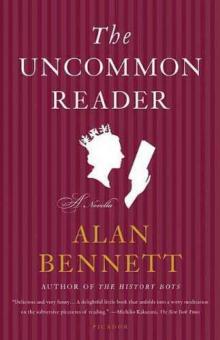 The Uncommon Reader: A Novella
The Uncommon Reader: A Novella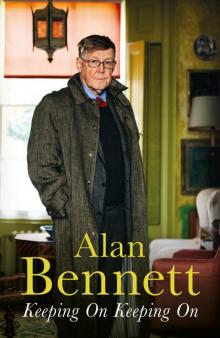 Keeping On Keeping On
Keeping On Keeping On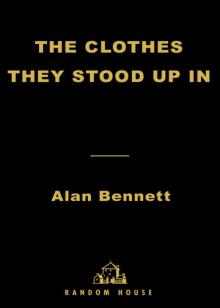 The Clothes They Stood Up In
The Clothes They Stood Up In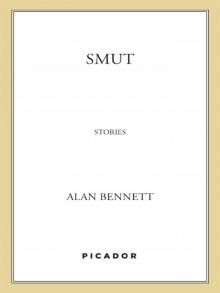 Smut: Stories
Smut: Stories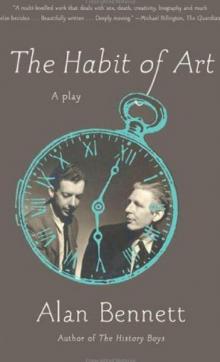 The Habit of Art: A Play
The Habit of Art: A Play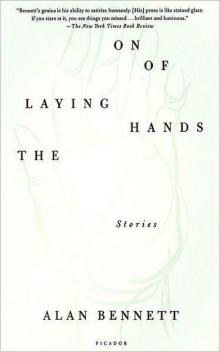 The Laying on of Hands: Stories
The Laying on of Hands: Stories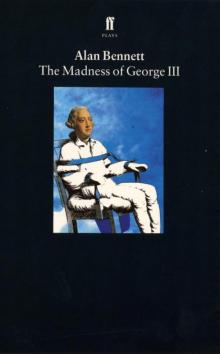 The Madness of George III
The Madness of George III Writing Home
Writing Home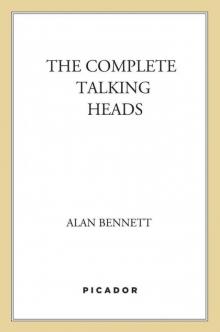 The Complete Talking Heads
The Complete Talking Heads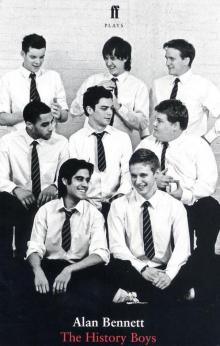 The History Boys
The History Boys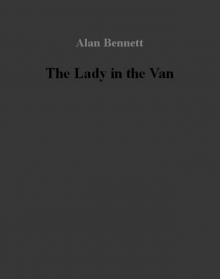 Lady in the Van
Lady in the Van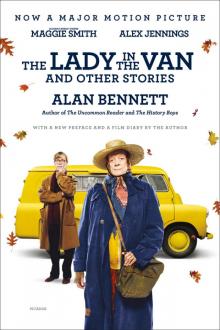 The Lady in the Van
The Lady in the Van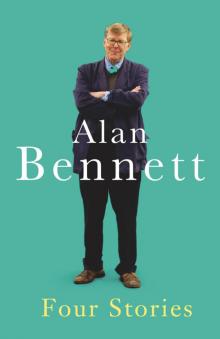 Four Stories
Four Stories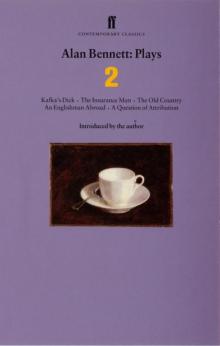 Alan Bennett: Plays, Volume 2
Alan Bennett: Plays, Volume 2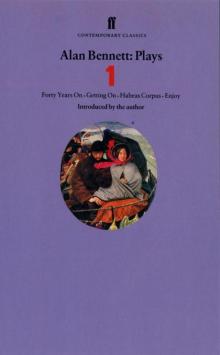 Alan Bennett: Plays, Volume 1
Alan Bennett: Plays, Volume 1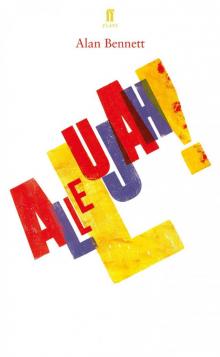 Allelujah!
Allelujah!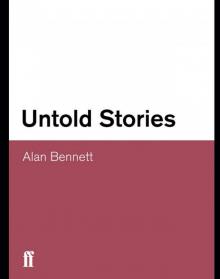 Untold Stories
Untold Stories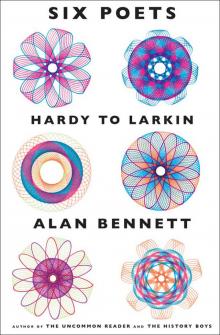 Six Poets
Six Poets